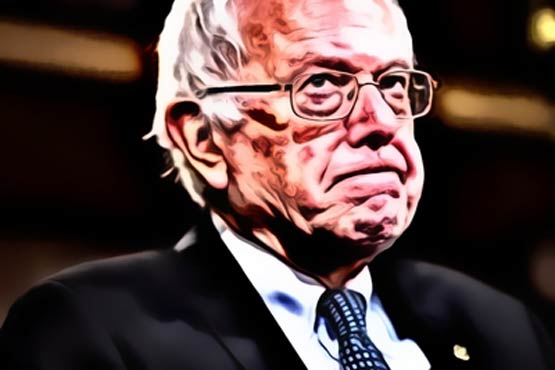
Senior Democratic lawmakers on Tuesday sought to stave off town hall protests of their own party, asking Sen. Bernie Sanders, I-Vt., to reach out and urge activists to redirect their anger at Republicans, instead of at moderate Democratic lawmakers.
The request came in a weekly meeting of top Democratic senators, according to a senator in attendance, ahead of a congressional recess next week when lawmakers in both parties are expected to face large crowds stirred in recent weeks by President Trump's early executive actions and ongoing Republican attempts to revamp the Affordable Care Act.
Over the past two weeks, crowds - and conflict-hungry media crews - have swarmed town halls and protested at congressional offices. Republicans have gotten the brunt of it, with several members escorted by police through lines of shouting protesters, and some caught scrapping or re-scheduling public events or leaving out back doors to dodge angry activists.
But protesters have also gathered in blue states, marching to Schumer's home in Brooklyn to demand obstruction of Trump nominees, and showing up at the offices of safe-seat Democrats to demand that they filibuster Trump's Supreme Court nominee, Neil Gorsuch.
Such stories spurred Democrats to ask Sanders for help, according to Sen. Joe Manchin III, D-W. Va., who attended the meeting on Tuesday.
"They basically explained to Bernie, it looks like you could be the person that could calm down and make sure their energy and all this enthusiasm is directed in all the right proper channels," Manchin said. "Bernie has a voice, and if [protesters] want to be active, then direct them to where the problem may be or where they anticipate a problem."
The intra-party drama puts top party leaders like Senate Minority Leader Charles E. Schumer, D-N.Y., in a tricky political position. He can either fully embrace the far left and its rejuvenated activism - and risk alienating moderate lawmakers and voters -or push back too hard against the new activity and anger the party's base of support.
The request of Sanders came during a meeting with Schumer and a leadership team that stretches the ideological spectrum of his caucus. In addition to Sanders, a self-described socialist, and moderate Manchin, the group included Sens. Richard J. Durbin, D-Ill., Patty Murray, D-Wash., Debbie Stabenow, D-Mich., Elizabeth Warren, D-Mass., and Mark Warner, D-Va., among others.
Manchin is among the most imperiled Democrats facing reelection next year - one of five senators from states that Trump won in last year's presidential election. In total 25 Democrats face reelection in 2018.
Manchin insisted on Tuesday that the Democratic caucus is "unified in not wanting to repeal the Affordable Care Act. It's unified! So why would they spend any energy on any member who's already committed to that? They might not like those of us who come from other parts of the country that doesn't adhere to everything they say or want done, but on the big items, put your energy somewhere else. Bernie can deliver that message better than anybody else."
In a statement, Sanders made no mention of the Democrats' request and did not deny that it happened, but he also said that he would keep lobbying for a measure that would make it easier to re-import cheap prescription drugs from Canada - an issue that has divided Democrats. Last month, when 12 members of the Senate Democratic caucus broke with Sanders, they took a larger-than-expected amount of friendly fire from progressive activists.
"The good news is that during the budget debate 34 Democrats voted with 12 Republicans to substantially lower the cost of prescription drugs through re-importation," said Sanders. "During the last several weeks, my office has been working hard with those Democrats who voted against this amendment to write a strong bill that they could support. We also will be working with Republicans who voted against the amendment."
For the most part, Sanders has been working on projects to unite Democrats and progressives against Trump. Over the weekend, Sanders and Schumer announced a series of rallies against repeal of the Affordable Care Act, to be held on February 25. Sanders's highest-profile speech during the coming recess will be in Kansas, which progressives have characterized as a model of Republican misrule.
And Our Revolution, the group founded by Sanders in the wake of his 2016 presidential campaign, has not messaged against incumbent Democrats; its latest request for members, sent Tuesday morning, asked them to protest the upcoming meeting between Trump and Israeli Prime Minister Benjamin Netanyahu, saying that both men were "shamefully advancing bigoted agendas in Palestine and in the United States that are antithetical to peace, equality, justice, freedom, and all the values we stand for."
On the broader left, Democrats have been fair game for activists and organizations trying to channel their anger with Trump. Organizers of "Resist Trump Tuesdays," a weekly effort loosely organized by the progressive Working Families Party, have appeared at Democrats' offices, demanded town hall meetings, and protested Democrats who have voted for President Trump's cabinet nominees.
On Tuesday, a group of protesters in Maryland delivered "valentines" to the office of Sen. Benjamin Cardin, D-Md., who is up for re-election in 2018, with questions about why he was agreeing to meet with Gorsuch, after many Republicans refused to meet with blocked Obama nominee Merrick Garland. They handed out candy hearts with slogans like "Filibuster Me" and "Be My Accountable Democrat," and a sign that read "Roses are red, violets are blue, supporting Trump's cabinet makes you guilty too."
After Monday night's vote to confirm Stephen Mnuchin as treasury secretary, the Progressive Change Campaign Committee urged its members to complain to Manchin, the one Democrat who supported Trump's nominee.
"He voted with Wall Street and against working families. Can you call him right now to express disapproval of this vote?" PCCC asked in the email blast. "Sen. Manchin needs to hear from constituents that voting with Wall Street is the opposite of being 'independent.' It's favoring the big guys against the little guy. That's the opposite of what West Virginians need."
Manchin said on Tuesday that he isn't worried about confronting progressive activists back home.
"I'm not concerned about it at all. It is what it is. I love people to come and voice their thoughts," he said.
But he urged progressives to be selective about when and where to speak out.
"If they're coming to disrupt, make sure they're going to the people who are opposing what they're for," he said.
"I think it's great. It's going to help us," Schumer said of the far left's renewed activism in a recent Washington Post interview. But he cautioned Democrats that the diverse political makeup of his caucus - "from Bernie to Joe" as Schumer described it - will sometimes require some Democrats to seek accord with Republicans, including Trump.
"There should not be any animus to the people who are voting the other way because their states or conscience dictates it," Schumer said. "And that's what I've tried to make clear to our caucus."
Republicans, meanwhile, are increasingly describing the town hall disruptions as prefabricated. Rep. Jason Lewis, R-Minn., a freshman who Democrats have put near the top of their 2018 target list, recalled a conversation with a constituent who got him on the phone and demanded a town hall -- even after he answered her question.
"You know that joke, 'I went to a fight and a hockey game broke out?' It's like, 'I went to a riot and a town hall broke out,' " said Lewis. "A lot of this is being organized by a number of outside groups. There's real concern in the district - this is a big deal - but there's a lot of astroturfing, too."
At a meeting on Tuesday with reporters organized by the Heritage Foundation, Rep. Scott Perry, R-Penn., said that he'd seen ads on Facebook offering cash to people who showed up to protest Republicans. But Rep. Raul Labrador, R-Id., argued that the tea party movement's push into Republican districts - activism that helped defeat several Republican members of the House and Senate in their primaries - gave it credibility that the Democratic "resistance" so far lacks.
"This was not some organic movement that went against Obama," said Labrador. "This was people who wanted their party to represent them. Democrats should want the same thing."
Previously:
• 01/02/17 Dems plan to target eight Trump Cabinet nominees
• 07/18/16 Not so fast: Defeated anti-Trump delegates vow trouble during the convention
• 07/15/16 Attempts to unbind GOP delegates crushed, effectively ending 'Never Trump' movement
• 07/14/16 Your definitive guide to the RNC Rules Committee meeting
• 07/13/16 GOP moves closer to base in platform
• 07/12/16 What to expect as Republicans start meeting in Cleveland
• 06/30/16 The many unknowns of the GOP convention
• 06/30/16 Anti-Trump delegates raising money for staff and a legal defense fund
• 06/03/16 In the age of Trump, Latino Republicans are anguished over what to do
• 04/29/16 Rubio tries to hang onto to delegates to maintain leverage at convention
• 04/13/16 Cruz likely to block Trump on a second ballot at the GOP convention
• 04/11/16 Trump is ahead, but Cruz keeps winning the trickier delegate contests
• 03/15/16 Across Florida, Marco Rubio is in a hurry
• 03/11/16 Rubio seen as having decent chance of besting Trump in Florida
• 02/09/16 Something has clicked for Jeb Bush in the last few days
• 02/08/16 Will New Hampshire be the last stand for Jeb Bush?
• 01/25/16 John Kasich - remember him? - is on the rise in New Hampshire



 Contact The Editor
Contact The Editor
 Articles By This Author
Articles By This Author